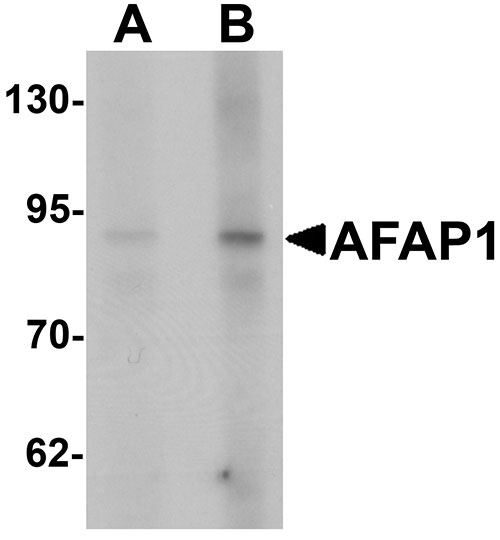AFAP1 Antibody
- SPECIFICATION
- CITATIONS
- PROTOCOLS
- BACKGROUND

Application
| WB, E |
|---|---|
| Primary Accession | Q8N556 |
| Other Accession | NP_940997, 197382472 |
| Reactivity | Human, Mouse |
| Host | Rabbit |
| Clonality | Polyclonal |
| Isotype | IgG |
| Calculated MW | 80725 Da |
| Application Notes | AFAP1 antibody can be used for detection of AFAP1 by Western blot at 1 - 2 µg/mL. |
| Gene ID | 60312 |
|---|---|
| Target/Specificity | AFAP1; Monomer and homomultimer of AFAP1 are known to exist; AFAP1 antibody is predicted to not cross-react with other AFAP family members. |
| Reconstitution & Storage | AFAP1 antibody can be stored at 4℃ for three months and -20℃, stable for up to one year. As with all antibodies care should be taken to avoid repeated freeze thaw cycles. Antibodies should not be exposed to prolonged high temperatures. |
| Precautions | AFAP1 Antibody is for research use only and not for use in diagnostic or therapeutic procedures. |
| Name | AFAP1 |
|---|---|
| Synonyms | AFAP |
| Function | Can cross-link actin filaments into both network and bundle structures (By similarity). May modulate changes in actin filament integrity and induce lamellipodia formation. May function as an adapter molecule that links other proteins, such as SRC and PKC to the actin cytoskeleton. Seems to play a role in the development and progression of prostate adenocarcinoma by regulating cell-matrix adhesions and migration in the cancer cells. |
| Cellular Location | Cytoplasm, cytoskeleton, stress fiber |
| Tissue Location | Low expression in normal breast epithelial cell line MCF-10A and in tumorigenic breast cancer cell lines MCF-7, T-47D and ZR-75-1. Highly expressed in the invasive breast cancer cell lines MDA-MB-231 and MDA-MB-435. Overexpressed in prostate carcinoma |

Thousands of laboratories across the world have published research that depended on the performance of antibodies from Abcepta to advance their research. Check out links to articles that cite our products in major peer-reviewed journals, organized by research category.
info@abcepta.com, and receive a free "I Love Antibodies" mug.
Provided below are standard protocols that you may find useful for product applications.
Background
AFAP1 Antibody: The actin filament-associated protein AFAP1 (AFAP-110) is an actin cross-linking protein first identified as a substrate of the viral oncogene v-Src. AFAP1 has a fundamental role in actin cytoskeleton arrangement. It contains a carboxyterminal actin-binding domain that directly binds to F-actin and serves as an adaptor protein in the regulation of SRC and PKC signal transduction by several functional domains, including 2 pleckstrin homology (PH) domains, a Src homology 3-binding (SH3-binding) motif, and several SH2-binding motifs. It is overexpressed in prostate carcinoma and contributes to tumor growth by regulating cell-matrix adhesions and migration in the cancer cells. AFAP1 represent a possible therapeutic target for controlling tumorigenesis and metastasis.
References
Flynn DC, Leu TH, Reynolds AB, et al. Identification and sequence analysis of cDNAs encoding a 110-kilodalton actin filament-associated pp60src substrate. Mol. Cell. Biol. 1993;13:7892-900.
Baisden JM, Gatesman AS, Cherezova L, et al. The intrinsic ability of AFAP-110 to alter actin filament integrity is linked with its ability to also activate cellular tyrosine kinases. Oncogene 2001; 20:6607-16.
Baisden JM, Qian Y, Zot HM, et al. The actin filament-associated protein AFAP-110 is an adaptor protein that modulates changes in actin filament integrity. Oncogene 2001; 20:6435-47.
Zhang J, Park SI, Artime MC, et al. AFAP-110 is overexpressed in prostate cancer and contributes to tumorigenic growth by regulating focal contacts. J. Clin. Invest. 2007; 117:2962-73.
If you have used an Abcepta product and would like to share how it has performed, please click on the "Submit Review" button and provide the requested information. Our staff will examine and post your review and contact you if needed.
If you have any additional inquiries please email technical services at tech@abcepta.com.













 Foundational characteristics of cancer include proliferation, angiogenesis, migration, evasion of apoptosis, and cellular immortality. Find key markers for these cellular processes and antibodies to detect them.
Foundational characteristics of cancer include proliferation, angiogenesis, migration, evasion of apoptosis, and cellular immortality. Find key markers for these cellular processes and antibodies to detect them. The SUMOplot™ Analysis Program predicts and scores sumoylation sites in your protein. SUMOylation is a post-translational modification involved in various cellular processes, such as nuclear-cytosolic transport, transcriptional regulation, apoptosis, protein stability, response to stress, and progression through the cell cycle.
The SUMOplot™ Analysis Program predicts and scores sumoylation sites in your protein. SUMOylation is a post-translational modification involved in various cellular processes, such as nuclear-cytosolic transport, transcriptional regulation, apoptosis, protein stability, response to stress, and progression through the cell cycle. The Autophagy Receptor Motif Plotter predicts and scores autophagy receptor binding sites in your protein. Identifying proteins connected to this pathway is critical to understanding the role of autophagy in physiological as well as pathological processes such as development, differentiation, neurodegenerative diseases, stress, infection, and cancer.
The Autophagy Receptor Motif Plotter predicts and scores autophagy receptor binding sites in your protein. Identifying proteins connected to this pathway is critical to understanding the role of autophagy in physiological as well as pathological processes such as development, differentiation, neurodegenerative diseases, stress, infection, and cancer.


